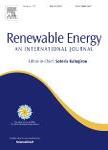版权所有:内蒙古大学图书馆 技术提供:维普资讯• 智图
内蒙古自治区呼和浩特市赛罕区大学西街235号 邮编: 010021

作者机构:Hong Kong Polytech Univ Fac Construct & Environm Dept Bldg Serv Engn Hong Kong Peoples R China City Univ Hong Kong Dept Architecture & Civil Engn Hong Kong Peoples R China Hunan Univ Coll Civil Engn Minist Educ Key Lab Bldg Safety & Energy Efficiency Changsha 410082 Hunan Peoples R China
出 版 物:《RENEWABLE ENERGY》 (再生能源)
年 卷 期:2020年第153卷
页 面:375-391页
核心收录:
学科分类:0820[工学-石油与天然气工程] 080703[工学-动力机械及工程] 08[工学] 0807[工学-动力工程及工程热物理]
基 金:Hong Kong Polytechnic University City University of Hong Kong Hunan University
主 题:Aerogel glazing system Climatic regions Machine learning Optimization function Teaching-learning-based optimization
摘 要:Integrating advanced materials in building glazing systems is critical for promoting net-zero energy buildings. In this research, both experimental and numerical studies were conducted on an aerogel glazing system. In order to provide climate adaptive designs on the aerogel glazing system with optimal geometric and operating parameters, a generic optimization methodology was developed by flexibly integrating supervised machine learning and advanced teaching-learning-based optimization algorithm. The proposed optimization methodology was thereafter used for optimal system designs in different climate regions. Results indicate that the proposed surrogate model can intelligently and accurately learn and update the optimization function with straightforward mathematical associations between multi-variables and objectives. In addition, within optimal cases, total heat gain and heat flux are dominated by the extinction coefficient in southern cities, whereas the total heat gain is dominated by the thermal conductivity in the northern city, LanZhou. By adopting the proposed technique in this study, compared to optimal results following the Taguchi standard orthogonal array, the total heat gain can be reduced by 62.5% to 36.27 kWh/m(2) in LanZhou, and by 5.9% to 267.18 kWh/m(2) in GuangZhou, respectively. This study formulates a general methodology for climate adaptive optimal designs on aerogel glazing systems in different climatic regions. (C) 2020 Elsevier Ltd. All rights reserved.